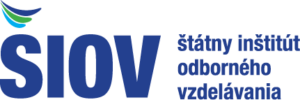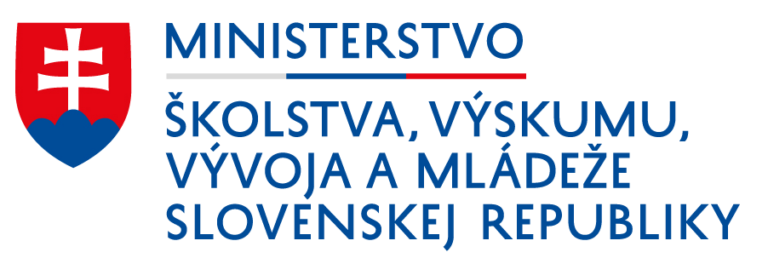Vocational education and training
The State Educational Programmes (hereinafter referred to as "SEP") define the compulsory content of education - the core curriculum - in the field of vocational education and training (hereinafter referred to as "VET"), which is guaranteed by the state. They are issued and published by the Ministry of Education, Science, Research and Sport of the Slovak Republic after consultation with employers, school founders and their professional and interest associations with nationwide scope and with line ministries within the scope of their sectoral competence in accordance with generally binding legislation. The curricula are developed for each group of disciplines and their title corresponds to the name of the group of disciplines. The curriculum frameworks are binding curriculum documents for the development of school curricula, textbooks, teaching texts and workbooks, and for the assessment and control of learning outcomes.
Rada zamestnávateľov pre odborné vzdelávanie a prípravu je organizáciou koordinujúcou postup pri výkone pôsobnosti stavovských organizácií a profesijných organizácií v systéme odborného vzdelávania a príprave na povolanie. Rada zamestnávateľov pre OVP je vytvorená pod gesciou zamestnávateľov na základe reformy odborného vzdelávania a v súlade so zákonom č. 61/2015 Z. z. o odbornom vzdelávaní a príprave. Informácie pre školy a zamestnávateľov o činnosti rady ako aj informácie k poskytovaniu praktického vyučovania u zamestnávateľa sú zverejnené na www.rzovp.sk.
Groups of branches of the SNE
- 11 Fyzikálno-matematické vedy
- 21 Baníctvo, geológia a geotechnika
- 22 Hutníctvo
- 23, 24 Strojárstvo a ostatná kovospracujúca výroba I,II
- 25 Informačné a komunikačné technológie
- 26 Elektrotechnika
- 27 Technická chémia silikátov
- 28 Technická a aplikovaná chémia
- 29 Potravinárstvo
- 31 Textil a odevníctvo
- 32 Spracúvanie kože, kožušín a obuvi
- 33 Spracúvanie dreva
- 34 Polygrafia a médiá
- 36 Stavebníctvo, geodézia a kartografia
- 37 Doprava, pošty a telekomunikácie
- 39 Špeciálne technické odbory
- 42, 45 Poľnohospodárstvo, lesné hospodárstvo a rozvoj vidieka I,II
- 43 Veterinárske vedy
- 62,63, 64 Ekonomika a organizácia, obchod a služby I,II
- 68 Právne vedy
- 72 Publicistika, knihovníctvo a vedecké informácie
- 74 Telesná kultúra a šport
- 75 Pedagogické vedy
- 76 Učiteľstvo
- 82, 85 Umenie a umeleckoremeselná tvorba I,II
- 86 Umenie a umeleckoremeselná tvorba III
- 92 Bezpečnostné služby
Reform processes
Reform process in the implementation of the curriculum in the school year 2010/2011
In this school year, teaching was carried out in the first grades according to the 83 curricula approved on 15 June 2010 with effect from 1 September 2010; the second and third grades continue to be taught according to the curricula approved in 2008.
Implementation and validation of the curriculum in three-year courses has been completed. Post-secondary and post-secondary study fields completed the verification of the new curricula in the school year 2009/2010 after completing 2 years of study and in the school year 2010/2011 after completing 3 years of study. The situation was similar in higher vocational studies.
Four-year study fields continued education according to the new curriculum in the first, second and third year, teaching in the fourth year was carried out according to the valid basic pedagogical documents. The first graduates will graduate from the new programme in the 2011/2012 school year.
The five-year study fields carry out education according to the new curriculum in the first, second and third year, teaching in the fourth and fifth year is carried out according to the valid basic pedagogical documents. The first graduates will graduate from the new programme in the 2012/2013 school year. It follows that in the 2010/2011 school year, the four- and five-year courses are taught according to three types of pedagogical documents. The optimisation and rationalisation of the SPP should be addressed systematically only in the 2012/2013 school year, when the implementation of the five-year programmes will be completed.
As an open curriculum document, the curriculum was found to be a dynamic element for changing teachers' mindsets by the survey of SSSs at ISCED 2C, 3C, 4A and 5B levels and was positively adopted by the majority of teachers. During implementation, we found that:
the number of VET courses is quite large, the structure of the VET courses needs to be rationalised, the system of fields of study needs to be simplified, the system of graduation in fields of study with vocational training needs to be reconsidered.
Statute of the expert committees
Reform process in the implementation of the curriculum in the school year 2009/2010
Teaching continued according to the new curriculum in the second years of the Secondary School. The third, fourth and fifth grades continued to be taught according to the current basic pedagogical documents. Implementation validation was completed in the two-year courses. Some adjustments to the curriculum were introduced on an operational basis as a result of changes in general binding legislation. The following changes were made:
State educational programmes at ISCED 3A have been supplemented and modified: 22 Metallurgy; 23, 24 Mechanical engineering and other metalworking; 37 Transport, post and telecommunications; 39 Special technical disciplines; 63, 64 Economics and organisation, trade and services; 82, 85 Arts and arts and crafts; State educational programmes at ISCED 3C have been supplemented and modified: 21 Mining and Mining Geology; 31 Textiles and Clothing; 33 Woodworking and Manufacture of Musical Instruments; 36 Construction, Surveying and Cartography; 37 Transport, Post and Telecommunications; The time allocations in the state educational programmes at ISCED 3C have been adjusted in accordance with the Decree of the Ministry of Education of the Slovak Republic No. 282/2009 Coll. "Pursuant to Section 2(9), the teaching certificate shall be issued after completion of at least 1 400 hours of practical teaching, of which at least 1 200 teaching hours shall be vocational training. This provision applies to courses of study at secondary schools with vocational training in which, in addition to the school-leaving certificate, an apprenticeship certificate is issued'.
Statute of the expert committees
Reform process in the implementation of the curriculum in the school year 2008/2009
In the school year 2008/2009, 76 curricula were implemented at all levels of education with effect from 1 September 2008, initiated by secondary vocational schools (hereinafter referred to as "VET schools") to develop school education programmes (hereinafter referred to as "SEPs"). The SIV has developed a supporting methodological and didactic material "Methodological Guide for the Development of SEPs for VET schools" and model SEPs. It was a "lifeline" for SENCOs with detailed instructions on how to proceed with the development of the curriculum.
According to Section 161 Transitional Provisions, paragraph 8 of the Education Act (Education Act), all schools are obliged to establish school curricula for all forms of study at the level of ISCED 2C, ISCED 3C, ISCED 3A, ISCED 4A, ISCED 5B educational programmes with effect from 1 September 2008, starting from Year 1. The following applied:
The curricula have not been developed for the experimentally verified teaching and study courses, even if they are put into force as of 1 September 2008/2009 (§ 161 Transitional Provisions, para. 14 of the Education Act), the transitional period for the implementation of the target model of teaching two foreign languages according to the Concept of Teaching Foreign Languages in Primary and Secondary Schools (Conditions of Implementation) will end no later than in the school years 2017-2019.After the expiry of the transitional period, all schools must provide pupils with teaching of foreign languages in the target model. However, if a school that does not have the conditions for teaching a second foreign language in the transition period of 8. years, no later than the school year 2017-2019 due to a lack of qualified teaching staff, may transfer the defined time allocation for the second foreign language to the available hours in the general education section and may use it to strengthen the weekly teaching hours for those subjects that it considers key in relation to the field of study. If a school decides to introduce a second foreign language during the transitional period, it is obliged to start teaching it with effect from Year 1 in accordance with the new curriculum. The upper years shall complete the educational process according to the original curriculum. After the transition period, all schools must provide pupils with a second foreign language,
Pursuant to the Decree of the Ministry of Education of the Slovak Republic on secondary schools and on the list of fields of study and apprenticeship in which verification of special abilities, skills or talents is required pursuant to Sections 48(1) and 62(14) of the Education Act (the Education Act), the name of a group of fields of study and apprenticeship has been changed in some of the curricula with effect from 1 September 2008, as follows:
the name of the group of study and teaching disciplines 28 Other technical chemistry was changed to 28 Applied chemistry, the name of the group of study and teaching disciplines 34 Printing was changed to 34 Printing and media, the name of the group of study and teaching disciplines 42, 45 Agriculture and forestry was changed to 42, 45 Agriculture, forestry and rural development, the title of the group of study and teaching disciplines 82, 85 Arts, applied arts and handicrafts has been changed to 82, 85 Arts and handicrafts, in the educational field 'Man, values and society' the title of the teaching subject 'Social studies' has been changed to 'Civics', in the educational field of 'Mathematics and Information Work', the title of the course 'Applied Informatics' has been changed to 'Informatics', in the educational field of 'Purposeful Courses/Exercises', the title of the course 'Protection of Man and Nature' has been changed to 'Protection of Life and Health', for schools with a national minority language of instruction, the title of the course 'Slovak Language and Literature' has been changed to 'Slovak Language and Literature' in the educational area 'Language and Communication'; for schools with a national minority language of instruction, the title of the course 'Language and Literature of National Minorities' has been changed to 'Language of National Minorities and Literature' in the educational area 'Language and Communication'.
State educational programmes at ISCED 3A have been supplemented and modified: 22 Metallurgy; 23, 24 Mechanical engineering and other metalworking; 37 Transport, post and telecommunications; 39 Special technical disciplines; 63, 64 Economics and organisation, trade and services; 82, 85 Arts and arts and crafts; State educational programmes at ISCED 3C have been supplemented and modified: 21 Mining and Mining Geology; 31 Textiles and Clothing; 33 Woodworking and Manufacture of Musical Instruments; 36 Construction, Surveying and Cartography; 37 Transport, Post and Telecommunications; The time allocations in the state educational programmes at ISCED 3C have been adjusted in accordance with the Decree of the Ministry of Education of the Slovak Republic No. 282/2009 Coll. "Pursuant to Section 2(9), the teaching certificate shall be issued after completion of at least 1 400 hours of practical teaching, of which at least 1 200 teaching hours shall be vocational training. This provision applies to courses of study at secondary schools with vocational training in which, in addition to the school-leaving certificate, an apprenticeship certificate is issued'.
Statute of the expert committees
Expert commissions
Odborné komisie sú poradným orgánom riaditeľa ŠIOV. Sú zriadené na riešenie komplexných otázok obsahu odborného vzdelávania a prípravy v Slovenskej republike, na tvorbu štátnych vzdelávacích programov, riešenie koncepčných, experimentálnych, odborných, metodických, poradenských a ďalších úloh súvisiacich s odborným vzdelávaním a prípravou v stredných odborných školách. Sú zložené z pedagogických zamestnancov SOŠ, zo zástupcov MŠVVŠ SR a ďalších rezortných ministerstiev, ŠPÚ a relevantných priamo riadených organizácií MŠVVŠ SR, zamestnávateľských a stavovských organizácií, i vysokých škôl.
Štatút odborných komisií

